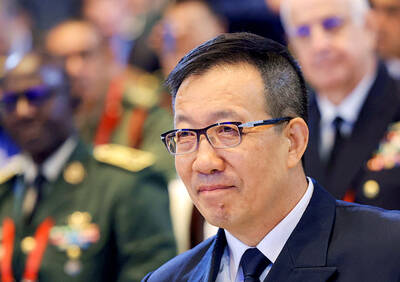Pierre Poilievre, who is running to reclaim a seat in Canada’s parliament next week, was on track to be Canadian prime minister until US President Donald Trump upended Canadian politics.
However, even if the Canadian Conservative Party leader wins tomorrow’s by-election in one of the country’s most right-wing districts, experts say he might struggle to regain momentum in a political arena still heavily shaped by the US president.
Poilievre’s Conservatives blew a massive polling lead in the run-up to Canada’s April general election, as voters backed the new Liberal leader, Canadian Prime Minister Mark Carney, to confront Trump.

Photo: Reuters
In a stinging humiliation, Poilievre lost to a Liberal in his own constituency, an Ottawa-area district he had represented for two decades, but the Conservatives performed solidly overall and deprived the Liberals of a majority, allowing Poilievre to suppress calls for him to go as party leader.
To return as opposition leader, Poilievre needed to get back into parliament. The MP for Battle River-Crowfoot — a rural district in the western province of Alberta where Conservatives dominate — offered to step down so Poilievre could run for his seat.
Poilievre is the favorite, but faces an uncertain path should he rejoin parliament, in part because some voters continue to see him as “a little Trump,” said Frederic Boily, a University of Alberta political scientist. In Canada, that is not a good brand.
Poilievre has sought to make clear that he sees Trump as a rival, but one that Carney is failing to confront.
“President Trump is the one putting these tariffs on Canadians, but Mark Carney is the one who promised Canadians he could ‘handle him’ and ‘win,’” Poilievre said this month
New Gallup data puts Canadian attitudes toward US political leadership at record lows. While the president’s threats to make Canada the 51st US state have subsided, his trade war is hurting crucial industries.
The Gallup survey showed that only 15 percent of Canadians approve of Washington, the lowest level on record in data going back to 2008. The next lowest approval rate — 16 percent — was recorded in 2018, during Trump’s first term.
For Donald Abelson, an expert on US-Canada relations at McMaster University, Poilievre is trying to “feed off the frustration and disillusionment in Canada about the imposition of tariffs and the bullying [while saying] that he, unlike Carney, is prepared to stand up to Trump.”
The strategy is limited, Abelson said, as Canadians want a long-term plan to realign the country away from the US — a central Carney talking point.
“If Poilievre overplays the Trump card, he’s making a mistake,” he said.

DEADLOCK: Putin has vowed to continue fighting unless Ukraine cedes more land, while talks have been paused with no immediate results expected, the Kremlin said Russia on Friday said that peace talks with Kyiv were on “pause” as Ukrainian President Volodymyr Zelenskiy warned that Russian President Vladimir Putin still wanted to capture the whole of Ukraine. Meanwhile, US President Donald Trump said that he was running out of patience with Putin, and the NATO alliance said it would bolster its eastern front after Russian drones were shot down in Polish airspace this week. The latest blow to faltering diplomacy came as Russia’s army staged major military drills with its key ally Belarus. Despite Trump forcing the warring sides to hold direct talks and hosting Putin in Alaska, there

North Korea has executed people for watching or distributing foreign television shows, including popular South Korean dramas, as part of an intensifying crackdown on personal freedoms, a UN human rights report said on Friday. Surveillance has grown more pervasive since 2014 with the help of new technologies, while punishments have become harsher — including the introduction of the death penalty for offences such as sharing foreign TV dramas, the report said. The curbs make North Korea the most restrictive country in the world, said the 14-page UN report, which was based on interviews with more than 300 witnesses and victims who had

COMFORT WOMEN CLASH: Japan has strongly rejected South Korean court rulings ordering the government to provide reparations to Korean victims of sexual slavery The Japanese government yesterday defended its stance on wartime sexual slavery and described South Korean court rulings ordering Japanese compensation as violations of international law, after UN investigators criticized Tokyo for failing to ensure truth-finding and reparations for the victims. In its own response to UN human rights rapporteurs, South Korea called on Japan to “squarely face up to our painful history” and cited how Tokyo’s refusal to comply with court orders have denied the victims payment. The statements underscored how the two Asian US allies still hold key differences on the issue, even as they pause their on-and-off disputes over historical

BEIJING FORUM: ‘So-called freedom of navigation advocated by certain countries outside the region challenges the norms of international relations,’ the minister said Chinese Minister of National Defense Dong Jun (董軍) yesterday denounced “hegemonic logic and acts of bullying” during remarks at a Beijing forum that were full of thinly veiled references to the US. Organizers said that about 1,800 representatives from 100 countries, including political, military and academic leaders, were in Beijing for the Xiangshan Forum. The three-day event comes as China presents itself as a mediator of fraught global issues including the wars in Ukraine and Gaza. Addressing attendees at the opening ceremony, Dong warned of “new threats and challenges” now facing world peace. “While the themes of the times — peace and development —